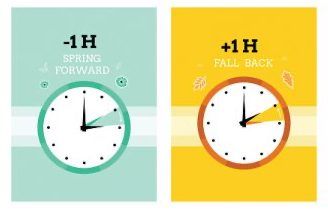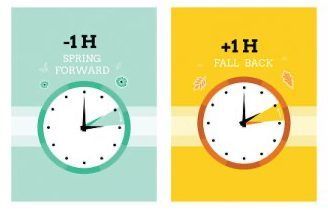Daylight Savings Time has been around for a couple of centuries, and it appears that it can aggravate people and their health routines in certain ways. According to Ruta Clair, assistant psychology professor, “there are studies that show that the transition is difficult.”
During the warmer seasons the days are lighter and longer. When the colder seasons come around, the time turns back an hour and the days become shorter and there is less sunlight. This is what people have grown accustom to over time.

“We have circadian and biological rhythms that we have that manage our sleep/wake cycles,” Clair said. “And when you mess with that, it throws people off.”
Generally, many people do not like the change in time.
“I think it’s a waste of time,” Lauren Belrado, sophomore and psychology major, said. “I think it’s not needed in today’s society, where it was needed in the past for farmers. Now, it’s useless at this point and not necessary anymore.”
“It makes me exhausted,” Clare Johnston, junior and psychology major, said. “I hate being tired.”
The transition of Daylight Savings can be more difficult than some may think, as it affects people emotionally and physically. Clair explains how the time change can misguide our circadian rhythms and lead to sleep loss.
“Sleep loss can affect mood, general functioning, attention, concentration – which is why there are frequent accidents,” Clair said. “Being tired is problematic for our functioning as human beings.”
“When you set the time back, we lose or gain an hour of sleep,” Belrado said. “It’s disrupting the whole system of our bodies because it’s on a schedule. Now we’re changing the bodies’ schedules and the bodies have to adapt to it. It can be very emotional, and when it gets dark earlier, that really affects people’s mental health due to the lack of sunlight.”
Although, when the time jumps back going forward, people may also find themselves struggling to get back on track. From a personal point of view, Belrado said “staying with your schedule and just moving and adjusting with the time” is a way people can do to stay on track with their routines.
“Exercise helps me fall asleep quicker,” Johnston said. “So, exercise can be a great way to help people stay with their daily schedules.”
Until the sun starts to set later, things start to positively look up for most people. They’re in better moods and they can enjoy more sunlight, unlike during the colder seasons.

“I think it makes people very happy,” Johnston said. “And it makes them relieved that it’s almost summer.”
“In the winter, when the days are much shorter, people have seasonal affective disorders,” Clair said. “So, people have difficulty managing mood and that brings moods lower as a general rule. For some people, it has a really significant effect.”
“I feel like it makes people feel like they didn’t have enough time in the day,” Belrado said. “When it’s dark, you automatically think it’s nighttime. It can make people feel sad to see the sun go down and that you have to stay in your room because it’s night.”
As Clair lastly stated, the extra daylight is great for people to enjoy the warmer weather and absorb fresh air and sunlight, whereas in the wintertime, kids are waiting for school buses in the dark and people lose sunlight.
“I think anytime you mess with people’s body rhythms, it’s going to have an effect,” Clair said. “I don’t know what the right answer is as far as should we stay in one time versus another? It’s a really complicated issue, not only for our own biology and psychology, but also economic, family, kids and safety wise.”




